Key takeaways:
- Hospital ministry merges spiritual care with physical healing, emphasizing the importance of being present for patients and their families during difficult times.
- Spiritual care fosters hope and connection, significantly impacting both patients’ emotional states and the overall hospital environment.
- Meditation serves as a tool for healing and self-awareness, helping individuals find clarity and calm amidst chaos.
- Prayer creates a sense of community and emotional comfort, enhancing resilience and purpose during challenging health journeys.
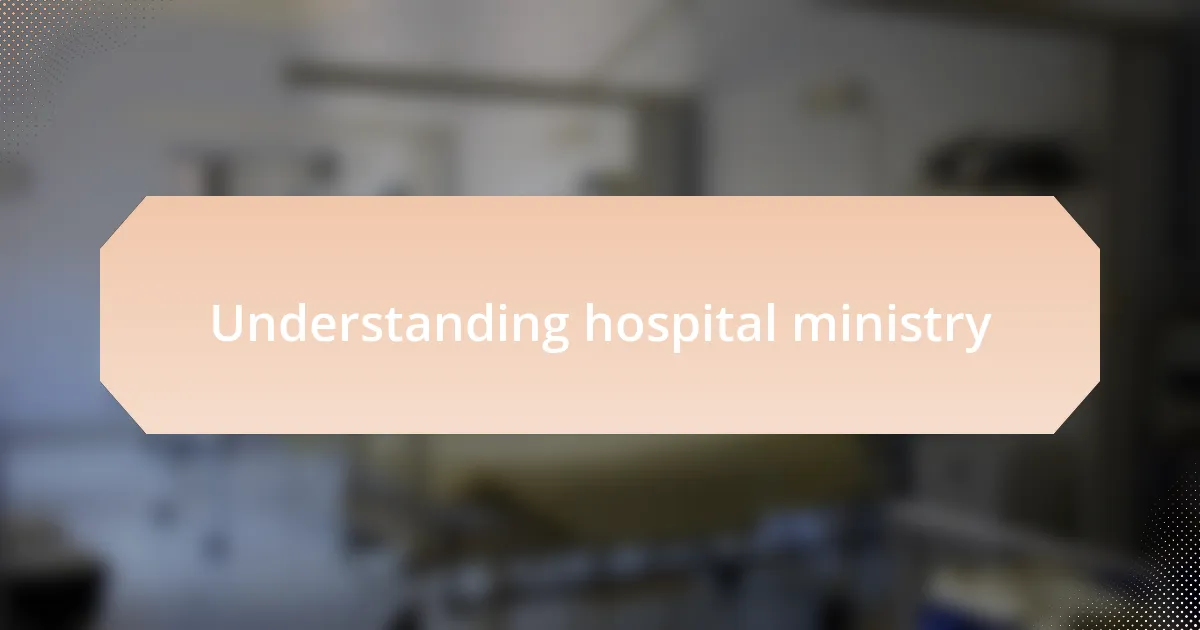
Understanding hospital ministry
Hospital ministry is a unique space where spiritual care intersects with physical healing. It’s not just about offering prayers or reading scripture; it’s about being truly present for patients and their families during some of life’s most challenging moments. Have you ever sat with someone who is grappling with fear and uncertainty? The simple act of listening can be transformative.
In my own experience, I’ve seen how a gentle conversation can bring solace to those who feel isolated within the clinical environment. One patient, who felt completely abandoned, shared how a few kind words and a prayer made them feel seen again. Isn’t it remarkable how a small gesture can light up someone’s darkest hour?
Furthermore, understanding hospital ministry means recognizing it as a vital part of the healing process. It aligns with the idea that true wellness encompasses mind, body, and spirit. Have you noticed how some people find peace in prayer, even when faced with dire circumstances? This intersection of faith and care fuels resilience, guiding both patients and caregivers through their journeys.

Importance of spiritual care
Spiritual care is essential in the hospital setting, as it provides patients with a sense of purpose and connection during difficult times. I remember a time when a patient, overwhelmed with despair, shared that their faith was their lifeline amidst uncertainty. When I encouraged them to embrace that faith through reflection, I witnessed an immediate shift in their demeanor; suddenly, they felt less alone, which deepened my understanding of how spiritual care can foster hope.
In my experiences, I’ve learned that spiritual care isn’t just about belief; it’s about the human experience. I once encountered a family facing a tragic diagnosis; they were devastated and searching for answers. By facilitating a conversation that allowed them to express their fears and hopes, I saw how addressing their spiritual needs improved their emotional state. Have you ever realized that in moments of distress, all a person needs is someone to acknowledge their pain and affirm their dignity?
The importance of spiritual care extends beyond individual presence; it impacts the larger community. I’ve observed that when spiritual care is integrated into hospital ministry, it can create a culture of compassion among staff and caregivers. This ripple effect not only uplifts patients but also revitalizes those who provide care. Isn’t it fascinating how addressing the spirit can lead to a more compassionate environment for everyone involved?
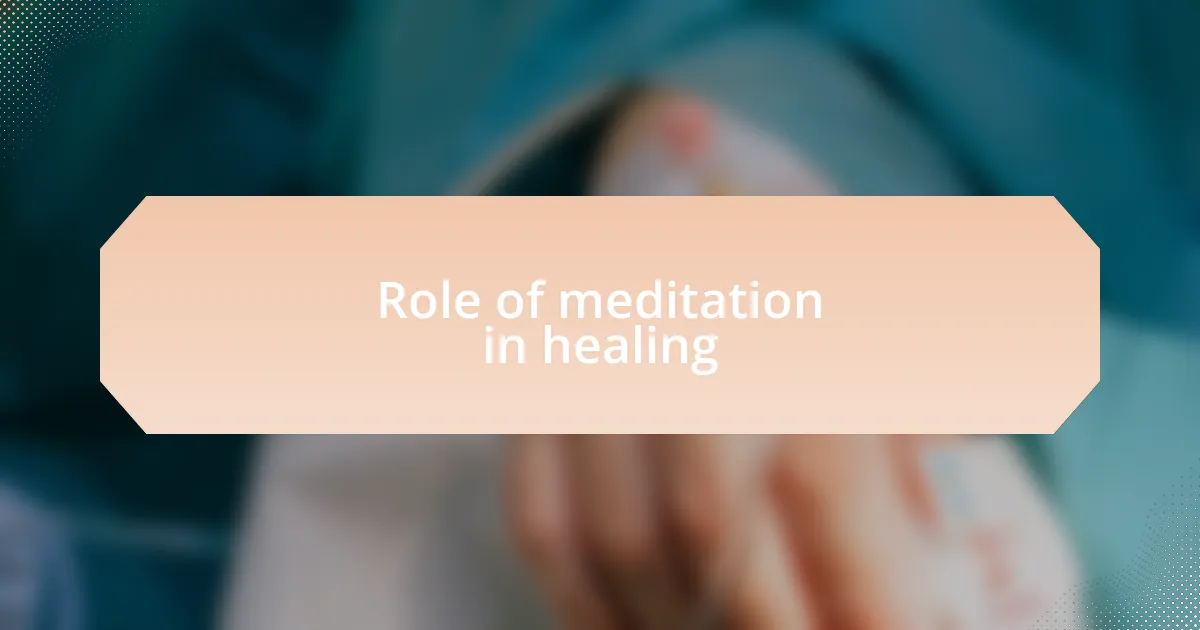
Role of meditation in healing
Meditation plays a profound role in healing, often acting as an anchor during turbulent times. I recall a patient who struggled with anxiety before a significant surgery. Introducing them to simple breathing techniques not only calmed their mind but also allowed them to embrace the present moment, which shifted their focus from fear to acceptance. This experience reinforced my belief that meditation can create a healing space within, even amidst external chaos.
In another instance, I guided a group through a meditative practice aimed at fostering inner peace. As we sat together, I noticed how the collective energy transformed the atmosphere. Patients who had once been withdrawn began to open up, sharing their reflections and connecting with each other. Isn’t it remarkable how meditation can weave a thread of unity, facilitating not only personal healing but also building community among those facing similar journeys?
Through my journey, I’ve seen that the benefits of meditation extend beyond relaxation; it serves as a pathway to deeper self-awareness. One time, during a quiet moment of personal reflection, I realized that meditation had become a tool for me to process my own emotions and experiences in the ministry. How many times have I turned to meditation to find clarity in challenging situations? In these moments, I found that healing often begins within, laying the groundwork for physical and emotional recovery.
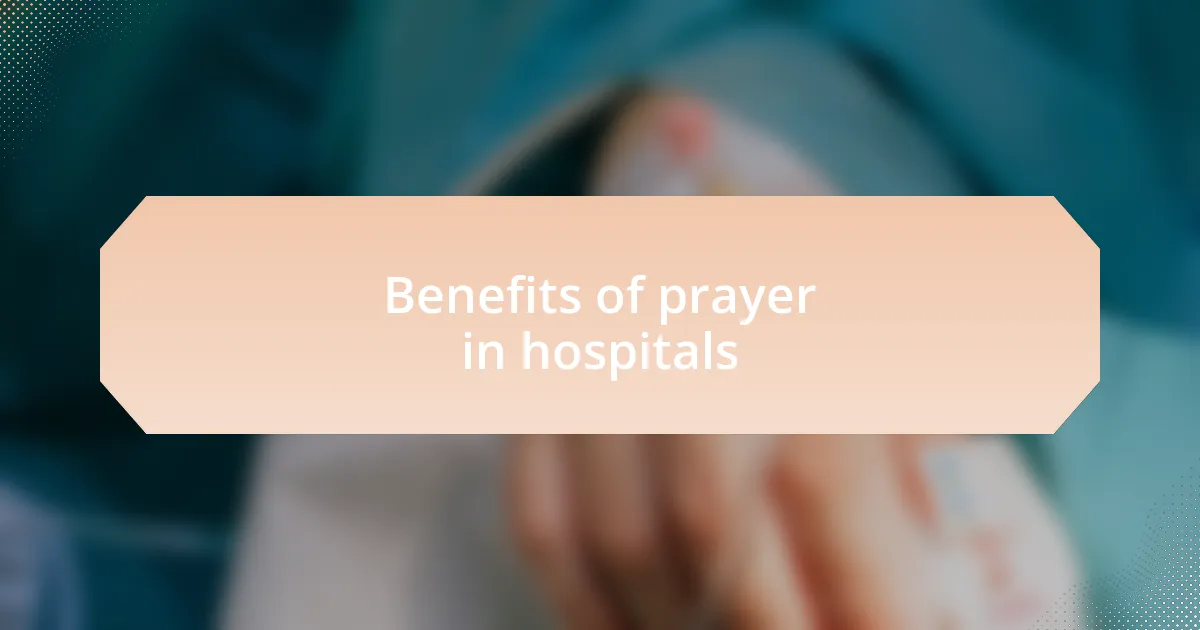
Benefits of prayer in hospitals
Prayer in hospitals serves as a beacon of hope for both patients and their families. I recall a time when I witnessed a family gather around a loved one’s bedside, hands joined and heads bowed in prayer. The palpable sense of calm that settled in the room was remarkable; it created a sacred space where fear and uncertainty seemed to dissipate, allowing for connection on a deeper level. How often do we underestimate the power of simply pausing to seek divine guidance in moments of distress?
In addition to providing emotional comfort, prayer can positively influence health outcomes. I remember discussing with a nurse who regularly led prayer circles for patients facing major health challenges. She shared how some patients reported feeling more at peace and had a sense of purpose during their treatment. Could it be that this spiritual practice helps foster resilience in the face of adversity? It certainly appears that prayer acts as a source of strength, encouraging patients to remain hopeful even when the odds seem insurmountable.
Moreover, I have seen the community aspect of prayer become a lifeline during difficult times. One evening, while visiting a patient, I noticed a group of hospital volunteers who had come together to pray for various cases. They created a comforting presence that extended beyond individual patients, uniting their intentions and hopes for healing. Isn’t it inspiring to think that something as simple as prayer can foster not only individual solace but also a strong sense of community among those grappling with life’s most challenging moments?
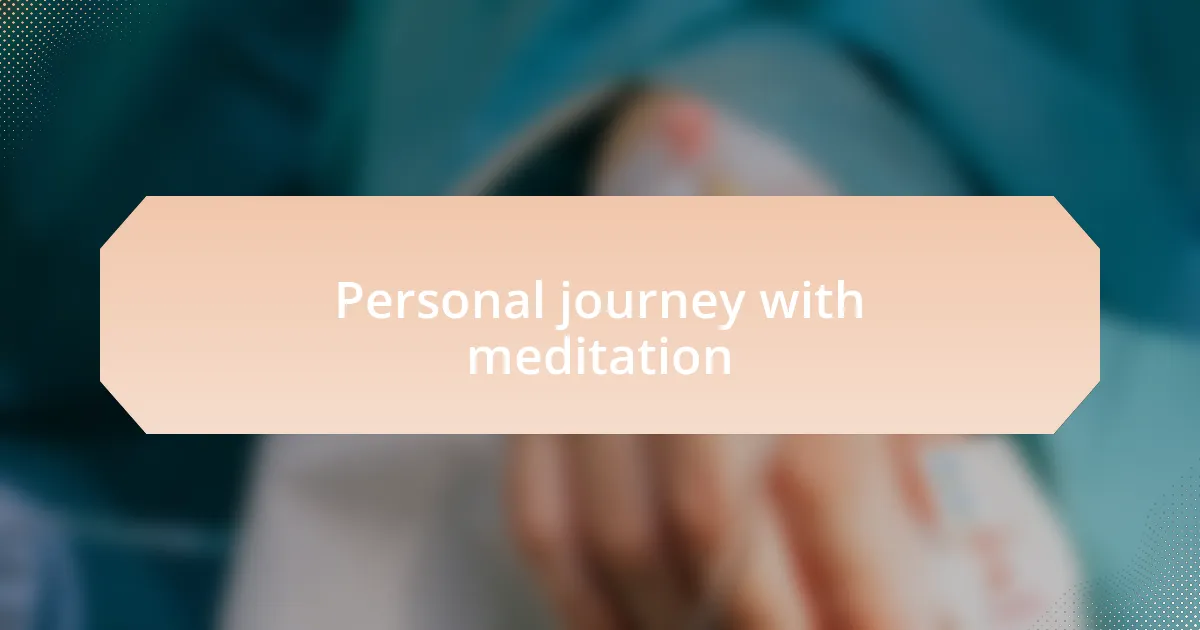
Personal journey with meditation
Meditation has been a transformative journey for me, weaving its way into the fabric of my daily life. I remember a particularly overwhelming day at the hospital when the chaotic energy felt all-consuming. In a quiet corner, I decided to take five minutes to breathe deeply and clear my mind. That small act of meditation allowed my thoughts to settle and provided a clarity that helped me navigate the rest of my day with renewed focus. Have you ever experienced that moment of peace amidst chaos?
As I delved deeper into my meditation practice, I began noticing subtle shifts in my emotional landscape. One evening, after a long day of visiting patients, I found myself sitting cross-legged in my living room, eyes closed, as waves of calm washed over me. It was during those moments that I truly understood the power of being present; it felt like hitting a reset button for my mind. How remarkable is it that a few intentional breaths can ground us in the here and now?
Over time, I’ve discovered that meditation is not just a personal retreat; it can also enhance my interactions within the hospital. Before entering a patient’s room, I often take a moment to center myself. This practice sets a tone of compassion and empathy, allowing me to connect more genuinely with those I meet. It makes me wonder—could this simple act of stillness cultivate a deeper sense of understanding and connection in our encounters with others?
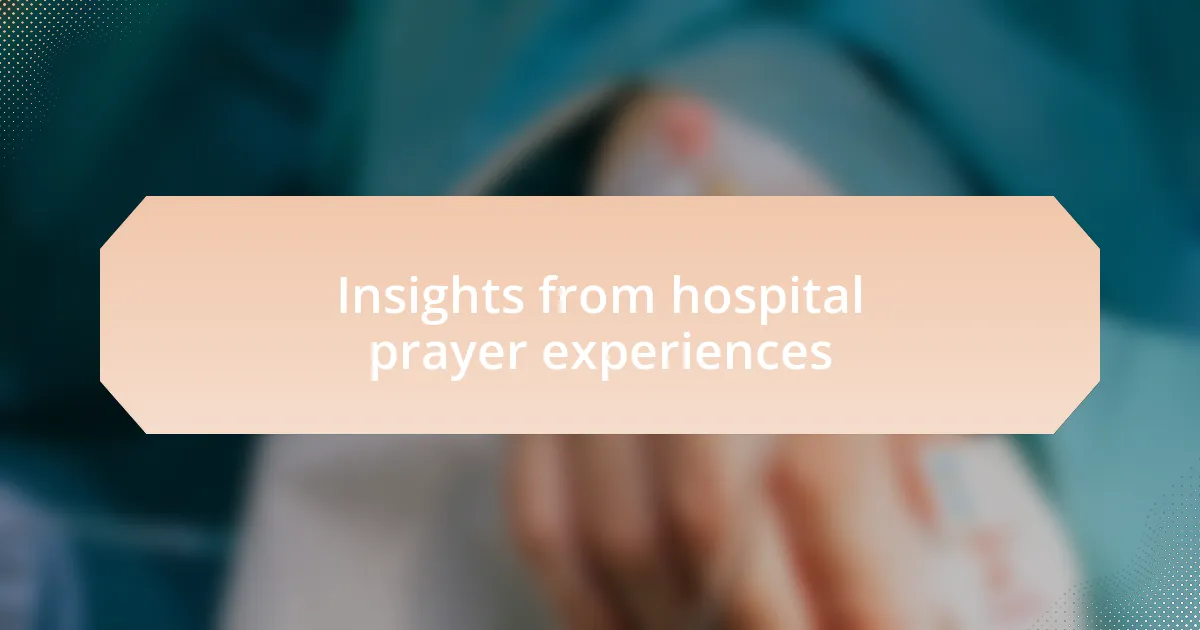
Insights from hospital prayer experiences
While engaged in hospital ministry, I’ve witnessed firsthand the profound impact that prayer can have on both patients and their families. One evening, I sat with a family poised on the edge of uncertainty, and as we prayed together, I felt a tangible shift in the room’s energy. It was as if our collective hopes and fears harmonized into a single moment of solace, a reminder that in unity, we find strength. Isn’t it fascinating how prayer can create a bridge between despair and hope?
There was a particularly poignant moment when a patient shared their fear of the unknown. I listened intently and then suggested a short prayer. As we spoke softly, I noticed their breathing steadying, transforming the atmosphere. That prayer not only calmed their spirit but also deepened our bond, reminding me how crucial it is to be present and vulnerable with one another. Have you ever found yourself in a similar situation, where shared words hold the power to heal?
Reflecting on these experiences, I realize that prayer in a hospital setting transcends mere ritual; it fosters a connection that can spark healing. Often, as I engage in this practice, I discover that my own faith strengthens as a result of witnessing the diverse ways in which others approach their beliefs. Could it be that each prayer not only serves the one in need but also nourishes the soul of the one praying?